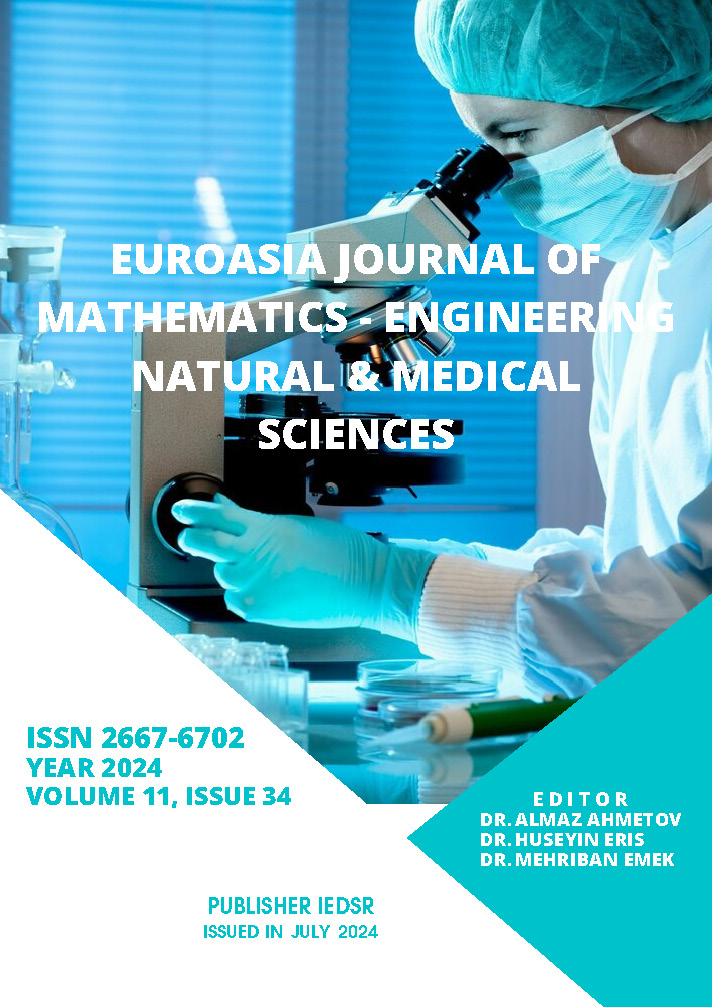The Use Of Artificial Intelligence Technologies In Surgical Nursing: Ethical Dilemma
DOI:
https://doi.org/10.5281/zenodo.13848063Keywords:
Surgical nursing, artificial intelligence, ethical dilemmaAbstract
This review aims to highlight the use of AI technology in the care of surgical patients by nurses, as well as potential ethical dilemmas that may arise from AI applications.The utilization of artificial intelligence (AI) technology in healthcare services is on the rise. The integration and application of AI technology in nursing care practices, which may include humanoid features, is a new area that nurses need to learn about.
References
Robert, N. (2019). How artificial intelligence is changing nursing. Nursing Management, 50 (9), 30–39. https://dx.doi.org/10.1097%2F01.NUMA.0000578988.56622.21
Şendir, M., Şimşekoğlu, N., Kaya,S., & Sümer, K. (2019). Geleceğin teknolojisinde hemşirelik. Sağlık Bilimleri Üniversitesi Hemşirelik Dergisi, 1(3), 209-214.
Büyükgöze, S., & Dereli, E. (2019). Dijital sağlık uygulamalarında yapay zekâ. VI. Uluslararası Bilimsel ve Mesleki Çalışmalar Kongresi-Fen ve Sağlık, Ankara
Pepito, J. A., & Locsin, R. (2019). Can nurses remain relevant in a technologically advanced future?. International Journal of Nursing Sciences, 6(1), 106-110. https://doi.org/10.1016/j.ijnss.2018.09.013
Bekker, M., Coetzee, S. K., Klopper, H. C., & Ellis, S. M. (2015). Non- nursing tasks, nursing tasks left undone and job satisfaction among professional nurses in south african hospitals. Journal of Nursing Management, 23(8), 1115– 1125. https://doi.org/10.1111/jonm.12261
Erat, Ş., Korkmaz, M., Çimen, V., & Yahyaoğlu, G. (2011). Hemşirelerin iş yaşam kalitesinin motivasyona etkisi. Uluslararası Hakemli Akademik Spor Sağlık ve Tıp Bilimleri Dergisi, 1(1), 48-76. http://dx.doi.org/10.11611/yead.37495
Chang, H. Y., Huang, T. L., Wong, M. K., Ho, L. H., Wu, C. N., & Teng, C. I. (2021). How robots help nurses focus on professional task engagement and reduce nurses’ turnover intention. Journal of Nursing Scholarship, 53(2), 237-245. https://doi.org/10.1111/jnu.12629
Özkan, S., Salık Asar, A. (2022). Cerrahi Hemşireliğinde Tele Sağlık Uygulamaları. Ege Üniversitesi Hemşirelik Fakültesi Dergisi, 38(1), 43-48. https://doi.org/10.53490/egehemsire.777580
Lo, A., Guarino, P., Richards, L., G. Haselkorn, J., & Wittenberg, G. (2010). Robot-assisted therapy for long-term upper-limb impairment after stroke. The New England Journal of Medicine, 1772-1783. https://doi.org/10.1056/nejmoa0911341
Turan Ş, Khorshıd L.(2022) Hemşirelerin Çalışma Ortamında Maruz Kaldıkları Ergonomik Risklerin İncelenmesi. Journal of Nursology. September 2022;25(3):126-131. doi:10.5152/JANHS.2022.764405
Baloğlu A, Kaplancalı UT ve Kılıç S. (2019) Bakıma ihtiyaç duyan yaşlılar için yardımcı sosyal robot araştırması ve analizi. Avrupa Bilim ve Teknoloji Dergisi, 2019;1-8. https://doi.org/10.31590/ejosat.626045
Doğan Merih, Y., & Akdoğan, E. (2021). Hemşirelikte yapay zekâ. 4th International Eurasian Conference on Biological and Chemical Sciences, Ankara.
Pu L, Moyle W, Jones C (2019) . How people with dementia perceive a therapeutic robot called PARO in relation to their pain and mood: A qualitative study. J Clin Nurs. 2020 Feb;29(3- 4):437-446. doi: 10.1111/jocn.15104. Epub 2019 Dec 2. PMID: 31738463.
Çoban, N., Göktaş, S., & Gezginci, E. (2020). Surgical procedures in covid-19 patients. In Duran, N., & Demir, H. (Eds). Current Researches in Health Sciences (pp. 211-222) Gece Akademi. ISBN:978-9949- 46-028-0.
Thuemmler, C., & Bai, C. (Eds.). (2017). Health 4.0: How virtualization and big data are revolutionizing healthcare (pp. 2168-2194). Cham Switzerland: Springer International Publishing
Clancy, T. R. (2020). Artificial Intelligence and Nursing: The Future Is Now. JONA: The Journal of Nursing Administration, 50(3), 125-127
Uzun, T. (2020). Yapay Zekâ ve Sağlık Uygulamaları. İzmir Kâtip Çelebi Üniversitesi İktisadi ve İdari Bilimler Fakültesi Dergisi, 3 (1), 80-92. Erişim Tarihi:28.05.2021 Erişim: https:// dergipark.org.tr/en/pub/ikacuiibfd/issue/54124/710604
Ronquillo CE,Peltonen LM , Pruinelli L,Chu,CH, FAAN SB, Ana Beduschi LLB, LLM and etc (2021). Artificial intelligence in nursing: Priorities and opportunities from an international invitational think-tank of the Nursing and Artificial Intelligence Leadership Collaborative. Journal of Advanced Nursing .2021;77(9):3707-17.19).
Erikson, H., & Salzmann Erikson, M. (2016). Future challenges of robotics and artificial intelligence in nursing: what can we learn from monsters in popular culture? The Permanente Journal, 20(3),15-17. http://dx.doi.org/10.7812/TPP/15-243
Saadatzi, M. N., Logsdon, M. C., Abubakar, S., Das, S., Jankoski, P., Mitchell, H., & Popa, D. O. (2020). Acceptability of using a robotic nursing assistant in health care environments: Experimental pilot study. Journal of Medical Internet Research, 22(11), e17509. https://doi.org/10.2196/17509
McGrow, K. (2019). Artificial intelligence: Essentials for nursing. Journal of Nursing, 49(9), 46. doi:10.1097/01.NURSE.0000577716.57052.8d
Tanioka, T., Osaka, K., Locsin, R., Yasuhara, Y., ve Ito, H. (2017). Recommended design and direction of development for humanoid nursing robots perspective from nursing researchers. Intelligent Control and Automation, 8(2), 96-110
Gibney, E. (2020). The battle for ethical AI at the world’s biggest machine-learning conference. Journal of Nature, 577(7791), 609-610
Güvercin CH 2020. Tıpta yapay zekâ ve etik. Ekmekci PE, editör. Yapay Zekâ ve Tıp Etiği. 1. Baskı. Ankara: Türkiye Klinikleri, 2020; p.7- 1
Etzioni, A., ve Etzioni, O. J. I. S. (2017). The ethics of robotic caregivers. Journal of Interaction Studies, 18(2), 174-190.
Keskinbora, K. H. (2019). Medical ethics considerations on artificial intelligence. Journal of Clinical Neuroscience, 64, 277- 282. doi:10.1016/j.jocn.2019.03.001
Stokes, F., ve Palmer, A. (2020). Artificial intelligence and robotics in nursing: Ethics of caring as a guide to dividing tasks between AI and humans. Journal of Nursing Philosophy, 21(4), e12306.
Gümüş, E., ve Kasap, E. U. (2021). Hemşirelik Mesleğinin Geleceği: Robot Hemşireler: The Future of the Nursing: Robot Nurses. Sağlık Bilimlerinde Yapay Zeka Dergisi (Journal of Artificial Intelligence in Health Sciences) ISSN: 2757-9646, 1(2), 20-25. (Erikson, 2016; Pepito ve Locsin, 2018).
Santoni de Sio, F., ve van Wynsberghe, A. (2016). When Should We Use Care Robots? The Nature-of-Activities Approach. Science and Engineering
Sun, T. Q., ve Medaglia, R. (2019). Mapping the challenges of Artificial Intelligence in the public sector: Evidence from public healthcare. Journal of Government Information Quarterly, 36(2), 368-383
Abbasgholizadeh-Rahimi, S., Granikov, V., & Pluye, P. (2020, May). Current works and future directions on application of machine learning in primary care. In Proceedings of the 11th Augmented Human International Conference (pp. 1-2).
Akgerman A, Özdemir Yavuz E D, Kavaslar İ, Güngör S. (2022)Yapay Zekâ ve Hemşirelik. Sağlık Bilimlerinde Yapay Zekâ Dergisi. 2022; 2(1):21-27
Downloads
Published
How to Cite
Issue
Section
License
Copyright (c) 2024 Euroasia Journal of Mathematics, Engineering, Natural & Medical Sciences

This work is licensed under a Creative Commons Attribution-NonCommercial 4.0 International License.





